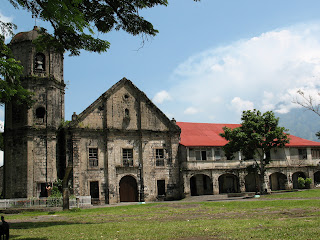
30 September 2007. 26th Sunday in Ordinary Time
Amos 6, 1-7; 1 Tim 6, 11-16; Luke 16, 19-31
Fr. James Keenan SJ has a very insightful look at sin using several examples from the Gospel, including the Gospel today about Lazarus and the rich man.
Many of us attribute our sins to our weakness. We even say that many of our sinfulness have been committed in moments of weakness: the spirit is willing but the flesh is weak. When we confess our sins, we have an array of weaknesses: I was angry, I struggle with my patience, I lied, I quarreled my brothers and sisters, I talked back at my mother, I disobeyed my parents, I fell short of my goals, and the frequent confessional matter is in our sexuality. We confess when we are broken and messy and weak. In this state, we believe we sin.
However, many theologians know that the stories in Scripture tells us that sins are committed out of our strength. In the Gospel today, the sin of the rich man is in his neglect of Lazarus who was in need. He knew who Lazarus was: he knew his name. He knew Lazarus waited at his gate, hoping to eat the scraps of bread he threw to the dogs. He could have done something for Lazarus, but he didn’t. That is not about weakness: he was capable of helping, but he just didn’t care. In the story of the Pharisee and the Publican, the sin of the Pharisee is in his consideration of what he has, in comparison with the Publican’s lesser assets. To bloat with one’s gifts is a sin about strength. Arrogance is egotism: we feel superior over others. In the Good Samaritan, the Levite and the priest ignore the wounded Samaritan. They were capable of extending help, but they didn’t because they do not want to mess their lives with long rituals of purification. In the Last Judgment, the goats and sheep will be separated: the goats are damned forever. What did they say to the Lord? “When were you hungry and we didn’t feed you? When were you thirsty, and we didn’t give you drink…” The sin of the ‘goats’ is the refusal to see Christ in each person: they could have done something but they didn’t. Sinning therefore is about our strength: we are capable of it, but we didn’t do it. Omission comes from the word, to omit. Thus we deliberately leave out, pass over, neglect, and exclude. We know it is there, but we decided not to do it.
Thus, Fr. Keenan captures the scope, depth and pervasiveness of sin. He defines it as simply the failure to bother to love. This captures the sins of the people we mentioned in Scripture. It captures the sins of the people in history. It captures our sins. We sin when we are comfortable and complacent, when we do not want to be bothered by the kid in the streets, the people in the slums, and the many victims of violence. When we are comfortable in our big houses, we do not want to shaken by the world’s problems, just as the people who dine and enjoy themselves in the first reading. Ayaw na natin maabala. Many of the students in the University of the
When we attribute our sins to our weakness, we sugar-coat the gravity of our sins and ignore the extent of our personal responsibility. But when we see that our sins is from our strength, we acknowledge that we have not used the power we have: the strength of our will, the existence of our freedom, the authority of our conscience, and the power of our gifts.
But what is not surprising and thus very alarming is this: Just as many students being hazed are not aware that they are being hazed, we sinners are not also aware how deep and serious our sins are. Ask them, they will always say, it’s ok.
*the sand that buried many houses in Albay: remnants of typhoon Reming.

















